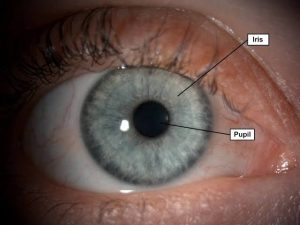The pupil is the circular opening in the center of the iris, the colored part of the eye. It plays a crucial role in regulating the amount of light that enters the eye.
Key characteristics:
- Location: The pupil is located in the center of the iris.
- Function: The pupil:
- Regulates light entry into the eye
- Adjusts size to control light intensity
- Helps maintain optimal vision
- Size adjustment: The pupil:
- Constricts (gets smaller) in response to:
- Bright light
- Near vision
- Certain medications
- Dilates (gets larger) in response to:
- Low light
- Emotional arousal
- Certain medications or substances
- Constricts (gets smaller) in response to:
- Control: The pupil’s size is controlled by the autonomic nervous system, specifically the:
- Parasympathetic nervous system (constriction)
- Sympathetic nervous system (dilation)
Importance: The pupil’s ability to regulate light entry is essential for maintaining optimal vision, protecting the retina, and responding to changes in lighting conditions.
